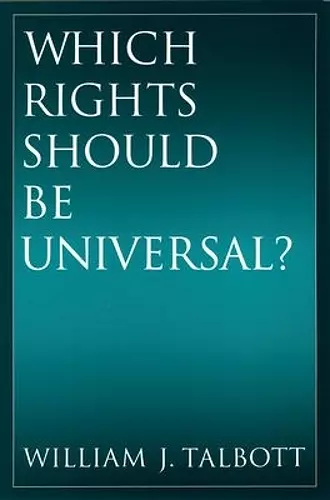Which Rights Should Be Universal?
Format:Paperback
Publisher:Oxford University Press Inc
Published:21st Jun '07
Currently unavailable, and unfortunately no date known when it will be back

We hold these truths to be self-evident... So begins the U.S. Declaration of Independence. What follows those words is a ringing endorsement of universal rights, but it is far from self-evident. Why did the authors claim that it was? William Talbott suggests that they were trapped by a presupposition of Enlightenment philosophy: That there was only one way to rationally justify universal truths, by proving them from self-evident premises. With the benefit of hindsight, it is clear that the authors of the U.S. Declaration had no infallible source of moral truth. For example, many of the authors of the Declaration of Independence endorsed slavery. The wrongness of slavery was not self-evident; it was a moral discovery. In this book, William Talbott builds on the work of John Rawls, Jürgen Habermas, J.S. Mill, Amartya Sen, and Henry Shue to explain how, over the course of history, human beings have learned how to adopt a distinctively moral point of view from which it is possible to make universal, though not infallible, judgments of right and wrong. He explains how this distinctively moral point of view has led to the discovery of the moral importance of nine basic rights. Undoubtedly, the most controversial issue raised by the claim of universal rights is the issue of moral relativism. How can the advocate of universal rights avoid being a moral imperialist? In this book, Talbott shows how to defend basic individual rights from a universal moral point of view that is neither imperialistic nor relativistic. Talbott avoids moral imperialism by insisting that all of us, himself included, have moral blindspots and that we usually depend on others to help us to identify those blindspots. Talbott's book speaks to not only debates on human rights but to broader issues of moral and cultural relativism, and will interest a broad range of readers.
"Talbott introduces an ambitious framework for identifying as universal those human rights essential to propelling moral 'progress.' The author's provocative discussion features numerous prominent philosophers and richly examined and illustrated philosophical issues. Highly recommended."--American Library Association
"No other work I am aware of comes close in making the consequentialist approach to rights come alive. Talbott somehow manages to provide the most detailed and skillful account of the philosophical, institutional, and empirical complexity of this approach without ever letting us lose sight of the simple humanitarianism that motivates it."-- Liam Murphy, New York University
This book deserves a wide readership. Whatever one's thousand disagreements with it, it is a fascinating exercise in ambitious liberal minimalism. By this I mean that it is not yet another lame attempt to promote a liberalism without universal rational foundations, but rather an effort to supply these as parsimoniously as possible. Whatever our doubts about the feasibility of this project, we are beholden to Talbott for undertaking it, and can all benefit from wrestling with the ingenuity with which he prosecutes it. --Clifford Owin, University of Toronto
ISBN: 9780195331349
Dimensions: 155mm x 231mm x 18mm
Weight: 340g
256 pages